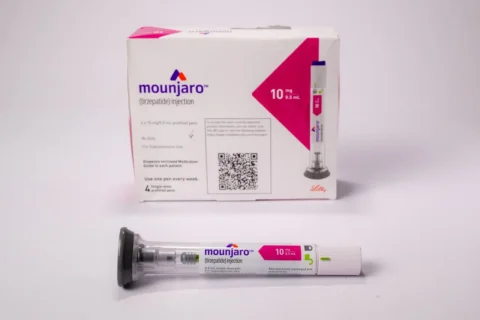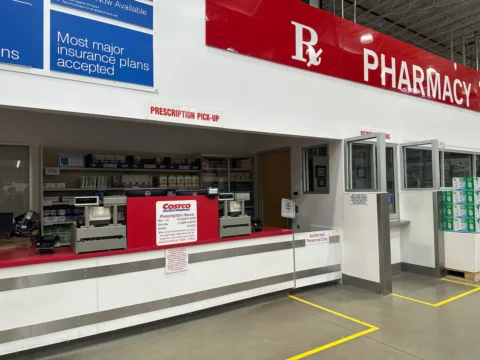What you’ll learn
In this article, you’ll discover what Ozempic® rebound is, why weight regain happens after stopping semaglutide, and how to manage it. We’ll cover the science behind GLP-1 medications, what to expect when transitioning off them, and practical tips to help you maintain your progress.
For many people, taking Ozempic® felt like a breakthrough. The weight finally started to come off, cravings quieted, and maybe eating felt manageable again. But what really happens when you stop taking Ozempic® for weight loss? For some, the weight begins to return, hunger creeps back in, and the progress once made can feel frustratingly fragile.
This is known as Ozempic® rebound, and we understand how disheartening it can feel. And no, it’s not a sign of failure. It’s more about how GLP-1 medications work and what happens when they leave your system.
Our licensed providers have helped thousands of patients navigate every stage of GLP-1 treatment, including what happens after stopping. We understand the science behind medications like Ozempic®, how they affect brain chemistry, metabolism, and appetite, and what your body goes through when they leave your system.
That’s why we’ve created this guide. We’ll explain what Ozempic® rebound really means, why it happens, and what you can do to protect the progress you’ve made. Whether you’re already off Ozempic®, thinking about stopping, or just planning ahead, we’re here to help you gain a better understanding.
What is Ozempic rebound?
Ozempic® rebound is the term you’ll hear used to describe weight gain that occurs after stopping semaglutide (the active ingredient in Ozempic®).
But this isn’t a reflection of willpower or effort. Semaglutide acts as a naturally occurring hormone called GLP-1 in your body, which helps it regulate appetite and blood sugar. When you stop the medication, that extra hormonal support disappears.
Your body gradually drifts back to how it was functioning before, and those biological changes that made losing weight easier while on Ozempic® start to reverse themselves.
This rebound effect is real and predictable. And it’s not just anecdotal. Clinical research is helping us better understand what happens when you stop taking Ozempic®, and why weight regain may be part of that process.
What happens after you stop taking semaglutide
One of the clearest examples comes from the STEP 1 trial extension, a study that followed people who took semaglutide for 68 weeks and then stopped.
Researchers tracked their weight and health markers for another year, without ongoing lifestyle coaching or anything else to help maintain their results.
People on semaglutide had some pretty impressive results. They lost about 17% of their starting weight on average. To put that in perspective, for someone who weighed 200 pounds, that’s around 34 pounds gone.
But here’s where things shift. Within just one year after stopping the medication, these same people gained back roughly two-thirds of what they’d lost. So that person who lost 34 pounds? They’d regain about 23 of those pounds.
In the end, their weight loss was only about 5% of their original weight. So instead of being 34 pounds lighter, they ended up just 10 pounds below where they started. That’s still something, but far less than what they achieved while on semaglutide.
Meanwhile, those in the placebo group (the ones who didn’t receive active medication) saw almost no long-term weight change.
The study also looked at cardiometabolic health, blood sugar, blood pressure, and cholesterol. These markers had improved during treatment, but most began drifting back toward baseline once the medication was stopped.
The takeaway? Semaglutide can work wonders while you’re taking it, but it’s not a permanent fix. Obesity behaves like other chronic conditions. Without ongoing management, your body tends to fight its way back to its previous state. This isn’t because you’ve done something wrong. It’s just a biological response that happens to most people.
So, how quickly does this rebound really start to show up after stopping treatment? That’s where things get even more important to understand.
How soon does weight gain start after stopping Ozempic®?
If you’re wondering what happens when you stop taking Ozempic®, timing can vary, but for many, weight regain begins within a few weeks to a few months after the last dose.
Think back on the STEP 1 trial. Most participants started seeing the numbers climb pretty quickly after discontinuing semaglutide. By the three-month checkpoint, the weight gain was definitely noticeable, and it continued steadily throughout the following year.
This doesn’t mean every person will regain weight immediately. Several things affect what happens, like how long you took Ozempic®, how much weight you actually lost while on it, your eating habits, how active you are, and how your body responds when the medication leaves your system.
Some Ozempic® rebound is common, but that doesn’t mean you’re helpless against it. There are several practical approaches that can minimize the impact and make your transition off the medication less unpredictable.
How to reduce the risk of weight gain after stopping Ozempic®
If you’re thinking about stopping Ozempic® or have already done so, you might be wondering how to avoid gaining weight after coming off Ozempic®. While there’s no magic formula that works for everyone, several strategies might help your body adjust to this transition more smoothly.
Stop taking Ozempic® gradually, not suddenly
Coming off semaglutide abruptly can make the shift harder on your system. Talk to your doctor about possibly tapering down your dose instead. This slower approach gives your body some breathing room to adjust, especially when it comes to hunger signals and digestive changes that can feel so overwhelming.
What to eat after stopping Ozempic® to avoid weight gain
One of the reasons Ozempic® supports weight loss is that it helps regulate hunger cues. After stopping, those signals can feel much louder. Sticking to consistent meal timing, focusing on protein and fiber, and cutting back on the sugary, ultra-processed food that can trigger cravings.
How movement supports weight maintenance
Don’t worry, exercise doesn’t have to be intense to be effective.
Regular movement, especially strength training or walking, helps counteract the slowdown in metabolism that can happen after weight loss. Plus, exercise naturally helps stabilize blood sugar and improve mood, both vital for keeping weight steady long-term.
Stay in touch with your provider after stopping semaglutide
Staying in touch with a provider during and after semaglutide treatment can make a big difference, especially if Ozempic® isn’t working anymore or your appetite is coming back faster than you expected.
Providers can spot early signs of rebound, give you personalized nutrition advice, and if things get tough, suggest other options like Wegovy, Mounjaro, or even restarting Ozempic® when it makes sense for your situation.
But even with the best plans, some people still experience rebound weight gain. If that’s where you are right now, here’s what to know and what to do next.
What to do if you’ve gained weight after stopping Ozempic®
The first step is simply noticing the shift that’s happening. Whether the scale is climbing or you’re just feeling hungrier and more preoccupied with food, these are telltale signs that your body is adjusting to life without semaglutide.
Some people find they can manage this transition with careful meal planning, regular physical activity, and more mindful eating habits. But if those strategies aren’t working like they used to, it might be time to reconnect with your provider.
Getting back on Ozempic® or trying a different GLP-1 medication like Wegovy® or Mounjaro® could give you that extra support your body needs right now.
Others may benefit from adjusting dosage, exploring lifestyle changes in more depth, or ruling out other health issues that affect weight. The key thing to remember is that you’ve got options. This isn’t a dead end.
You don’t have to manage this alone. Having an honest conversation with a provider helps clarify whether going back on medication makes sense for your specific body, your health goals, and your emotional well-being.
If you’re worried about cost or having trouble accessing care, weight loss treatment like ours can simplify the process of exploring these options without jumping through hoops.
Considering semaglutide treatment again? QuickMD makes it simple
Thinking about getting back on Ozempic® or trying another GLP-1 medication? You don’t have to figure everything out by yourself. We connect you with licensed providers who genuinely understand what happens when you stop taking semaglutide. They can help chart your path forward, whether that means resuming treatment or starting something new.
We offer access to proven weight loss medications like Ozempic®, Wegovy®, Mounjaro®, and Rybelsus, without the need for insurance or complicated paperwork. We keep things straightforward by bundling everything into one predictable monthly fee that covers your consultation, medication, and delivery right to your door. No hidden costs, no surprises.
If you’re eligible, a QuickMD provider can recommend a treatment approach tailored to your specific health goals, medical history, and financial situation. You can schedule an appointment any day of the week, and most patients can begin treatment the very same day.
Frequently asked questions about Ozempic® rebound
How long can you stay on Ozempic® for weight loss?
There’s no set time limit on how long you can take Ozempic® for weight loss. Since obesity is considered a chronic condition, similar to high blood pressure or diabetes, many patients end up staying on GLP-1 medications like Ozempic® for the long haul to maintain their results.
As long as the medication continues working well for you without problematic side effects, your healthcare provider might recommend keeping it as part of your ongoing health plan.
If you’re unsure how long you can stay on Ozempic® safely, your best bet is to talk with a healthcare provider at QuickMD who can look at your specific situation, including your medical history, how you’re responding to your medication, your long-term health objectives, and any risk factors unique to you.
Can you restart Ozempic® after switching to Mounjaro® or Wegovy®?
Yes, you can often go back to Ozempic® after trying another medication like Mounjaro® or Wegovy®.
This happens for a few reasons. A new medication didn’t work as well for your body, caused uncomfortable side effects, or became too expensive or hard to find. Just remember that restarting Ozempic® should always happen with medical supervision, especially since you might need to gradually work your way back up to your previous dose.
What happens when you stop Ozempic® for diabetes vs. weight loss?
The aftermath of stopping Ozempic® looks somewhat different depending on why you were taking it in the first place. If you were using it primarily for weight management, the main issues tend to be increased hunger and potential weight rebound.
For those with type 2 diabetes, stopping Ozempic® often means blood sugar levels start climbing too. Either way, it’s smart to partner with a healthcare provider like a QuickMD provider before discontinuing, since these rebound effects can impact both your weight and your broader health picture.




